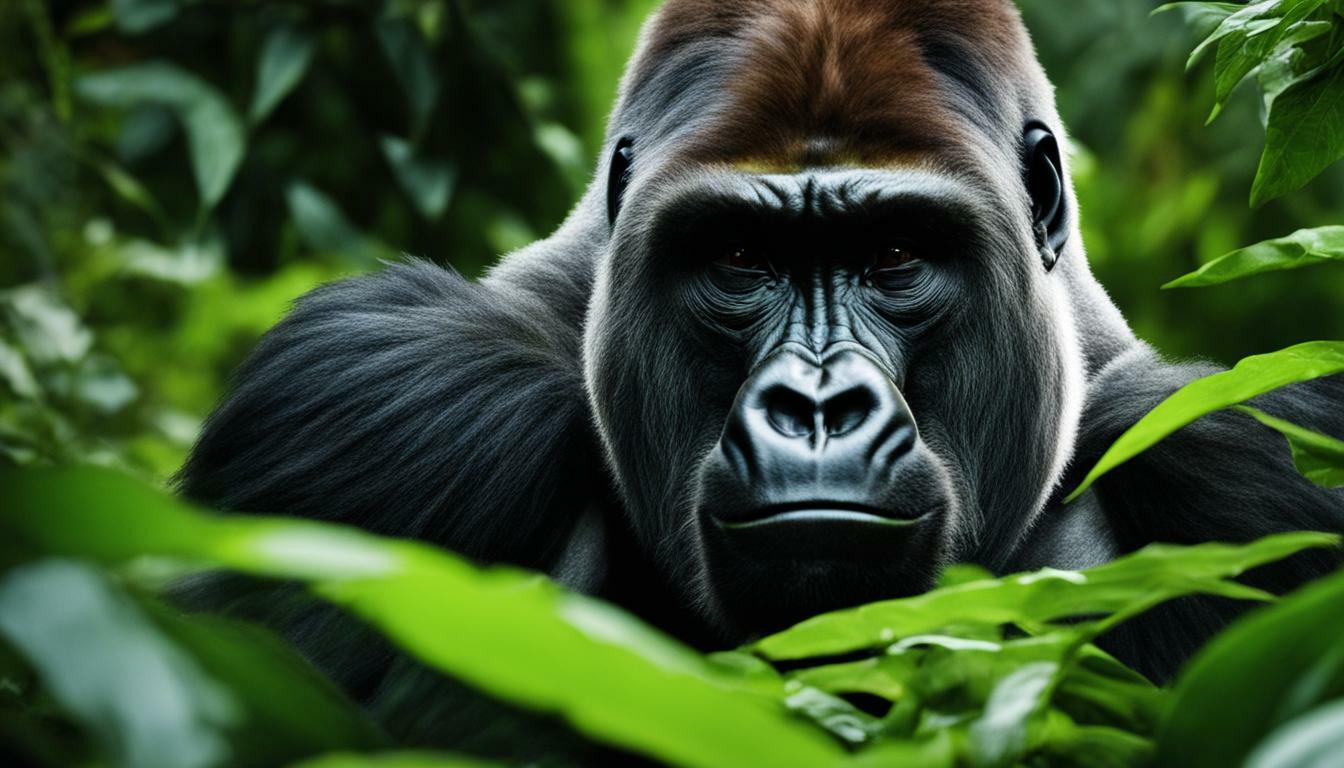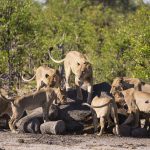Gorilla ecotourism initiatives play a crucial role in the conservation of these magnificent creatures, and by participating in responsible gorilla tourism, you can make a meaningful impact on their habitats. The mountain gorilla population has been experiencing a recovery, but their habitat is facing challenges due to industrialization in Africa. To secure safe space for the gorillas, the African Wildlife Foundation purchased land adjacent to Volcanoes National Park in Rwanda and donated it to the government. This expansion helps Rwanda invest in biodiversity and develop economic opportunities through tourism.
Ecotourism initiatives have been empowering local communities. The Sabyinyo Silverback Lodge, established by the African Wildlife Foundation in partnership with the Sabyinyo Community Livelihoods Association and Governor’s Camp, is owned by the community, and they receive a portion of the lodge’s revenues. This has generated millions of dollars, which has been used for education, electrification, and enterprise initiatives for the local people.
Volcanoes National Park in Rwanda is a popular tourist destination due to its unique gorilla treks. Visitors to the park have increased, and the revenues generated have contributed to Rwanda’s travel and tourism industry, which has been among the top five fastest-growing industries on the continent. Rwanda’s revenue-share program is the most generous in any African country, demonstrating its commitment to conservation.
Mountain gorillas are an endangered species, but conservation efforts have helped increase their population to over 1,000 individuals. The International Gorilla Conservation Program, supported by organizations like WWF, promotes best practices for gorilla tourism to ensure the well-being of the gorillas and prevent disease transmission between humans and gorillas.
To foster conservation and support local communities, a bottom-up approach is necessary. The current top-down management model should be replaced with one that involves local communities in decision-making and allocation of funds. Community-owned lodges offer economic opportunities and improve support for conservation. By channeling revenue-sharing money into such programs, there can be significant positive impacts on people’s quality of life and conservation efforts.
In conclusion, gorilla ecotourism initiatives have been successful in sustaining the mountain gorilla population and supporting local communities. Through community involvement and responsible tourism practices, it is possible to make a difference in the conservation of these endangered great apes.
Key Takeaways:
- Gorilla ecotourism initiatives play a crucial role in conserving the mountain gorilla population.
- By participating in responsible gorilla tourism, you can support gorilla habitat conservation.
- Ecotourism initiatives empower local communities and contribute to their economic development.
- Rwanda’s revenue-sharing program demonstrates its commitment to conservation and sustainable tourism.
- The International Gorilla Conservation Program promotes best practices for gorilla tourism and prevents disease transmission between humans and gorillas.
- A bottom-up approach involving local communities is vital for sustainable conservation efforts.
- Community-owned lodges provide economic opportunities and support for gorilla conservation.
The Impact of Ecotourism Initiatives on Gorilla Habitat Conservation
The mountain gorilla population is on the road to recovery, thanks to ecotourism initiatives focused on sustainable gorilla tourism and conservation projects aimed at protecting their habitats. These initiatives have had a positive impact on gorilla habitat conservation, ensuring the survival of this endangered species.
One notable example is the African Wildlife Foundation’s land purchase adjacent to Volcanoes National Park in Rwanda. By extending the protected area, this initiative provides a safe space for the gorillas to thrive and supports their long-term conservation. This expansion not only benefits the gorillas but also presents economic opportunities through tourism development.
Ecotourism initiatives have also empowered local communities. The establishment of the Sabyinyo Silverback Lodge, in partnership with the African Wildlife Foundation and the Sabyinyo Community Livelihoods Association, has been instrumental in supporting community-based gorilla conservation. The lodge is owned by the community, and they receive a portion of the lodge’s revenues. This has not only generated substantial funds but has also contributed to education, electrification, and enterprise initiatives for the local people.
Furthermore, the increase in visitors to Volcanoes National Park has significantly contributed to Rwanda’s travel and tourism industry. The revenues generated from gorilla tourism have been instrumental in supporting conservation efforts, making Rwanda a leader in gorilla sanctuary conservation and best practices. This commitment to sustainable gorilla tourism demonstrates the positive economic benefits that can be achieved through responsible ecotourism initiatives.
| Key Points: |
|---|
| The African Wildlife Foundation purchased land adjacent to Volcanoes National Park in Rwanda to secure safe space for the gorillas and support conservation efforts |
| The Sabyinyo Silverback Lodge is a community-owned initiative that has generated millions of dollars for education and enterprise initiatives |
| Gorilla tourism in Rwanda has contributed to the country’s travel and tourism industry, supporting conservation and showcasing best practices |
In summary, ecotourism initiatives focused on sustainable gorilla tourism and conservation projects have played a crucial role in the recovery of the mountain gorilla population. Through these initiatives, local communities have been empowered, and economic benefits have been harnessed to support both people and conservation efforts. By continuing to prioritize responsible ecotourism practices, we can make a significant difference in protecting these majestic creatures and their habitats.
Empowering Local Communities through Ecotourism
Ecotourism initiatives are not only benefiting gorilla conservation but also empowering local communities through community-based gorilla conservation efforts and the promotion of eco-friendly tourism practices. One notable example of this is the Sabyinyo Silverback Lodge, a collaborative project between the African Wildlife Foundation, the Sabyinyo Community Livelihoods Association, and Governor’s Camp. Owned and operated by the community, the lodge has become a source of significant revenue, generating millions of dollars that have been reinvested in education, electrification, and enterprise initiatives for the local people.
This community-based approach not only provides economic opportunities, but it also fosters a sense of ownership and pride among the local communities. By involving them in decision-making processes and allocating funds, the responsibility for gorilla conservation is shared, ensuring long-term sustainability. The success of the Sabyinyo Silverback Lodge serves as a model for other regions, demonstrating the positive impact that community-led ecotourism can have on both conservation and the well-being of local communities.
Supporting eco-friendly tourism practices is another key aspect of empowering local communities. By promoting sustainable tourism practices such as minimizing waste, conserving water and energy, and respecting wildlife habitats, visitors can contribute to the preservation of gorilla habitats and enhance the overall ecotourism experience. These practices not only benefit the gorillas but also create a more immersive and authentic experience for visitors, allowing them to connect with nature and local culture on a deeper level.
The combination of community-based conservation efforts and the promotion of eco-friendly tourism practices is a powerful force in gorilla conservation. By empowering local communities and encouraging responsible and sustainable tourism, we can make a significant difference in the protection of these majestic creatures and their habitats.
| Benefits of Community-Based Ecotourism | Benefits of Eco-Friendly Tourism |
|---|---|
|
|
“The Sabyinyo Silverback Lodge has transformed our community in ways we could never have imagined. The revenues generated have empowered us to improve our quality of life and invest in our future. We are proud to be stewards of our natural heritage and contribute to the conservation of gorillas.” – Local Community Member
Summary:
Ecotourism initiatives that focus on community-based gorilla conservation and promote eco-friendly tourism practices have proven to be effective in both sustaining the mountain gorilla population and empowering local communities. By involving communities in decision-making and revenue-sharing, and by encouraging responsible and sustainable tourism, the preservation of gorilla habitats and the well-being of local communities are prioritized. The success of projects like the Sabyinyo Silverback Lodge highlights the positive impact that community-led conservation efforts can have on both wildlife and people.
The Economic Benefits of Gorilla Tourism in Rwanda
Volcanoes National Park in Rwanda has become a sought-after destination for gorilla tourism, bringing significant economic benefits, promoting best practices, and supporting gorilla sanctuary conservation. The park’s unique gorilla treks have attracted a growing number of visitors, contributing to Rwanda’s travel and tourism industry, which has been one of the fastest-growing industries on the continent.
Through the revenue-sharing program, Rwanda has demonstrated its commitment to conservation. The country allocates a generous portion of the revenue generated from gorilla tourism to local communities. This program has not only improved their quality of life but has also fostered a sense of ownership and responsibility towards the protection of these endangered animals.
The economic benefits of gorilla tourism extend beyond the local communities. By investing in the conservation of gorilla sanctuaries, Rwanda ensures the long-term survival of the mountain gorilla population. Organizations like the African Wildlife Foundation, WWF, and the International Gorilla Conservation Program have played a crucial role in promoting best practices for gorilla tourism, ensuring the well-being of the gorillas and preventing disease transmission between humans and gorillas.
| Benefits of Gorilla Tourism in Rwanda | Impact |
|---|---|
| Economic Growth | Rwanda’s travel and tourism industry experiences significant growth due to gorilla tourism, creating job opportunities and attracting investments. |
| Conservation | The revenue generated from gorilla tourism is invested in gorilla sanctuary conservation, securing the habitat and protecting the endangered mountain gorillas. |
| Community Development | Local communities benefit from revenue-sharing programs, leading to improved education, infrastructure, and enterprise initiatives. |
In conclusion, the economic benefits of gorilla tourism in Rwanda are undeniable. The growth of the travel and tourism industry, the conservation efforts supported by revenue-sharing programs, and the improvement of local communities’ well-being all contribute to the sustainable conservation of mountain gorillas and their habitats.
Partnerships for Gorilla Conservation
Successful gorilla conservation efforts rely on partnerships between international organizations, governmental bodies, and local communities to ensure ethical gorilla tourism practices and safeguard the health of these endangered species. The International Gorilla Conservation Program, supported by organizations like the World Wildlife Fund (WWF), plays a crucial role in coordinating these partnerships and promoting best practices for sustainable gorilla tourism.
Through collaborative efforts, international organizations like the WWF work closely with local communities to develop and implement conservation initiatives. For example, the African Wildlife Foundation’s partnership with the Sabyinyo Community Livelihoods Association and Governor’s Camp has resulted in the establishment of the Sabyinyo Silverback Lodge. This community-owned lodge not only provides sustainable tourism opportunities but also generates revenue that is reinvested in education, electrification, and enterprise initiatives for the local people.
Furthermore, partnerships between governmental bodies and conservation organizations have led to significant achievements in gorilla habitat conservation. The African Wildlife Foundation’s land purchase and donation to the Rwandan government adjacent to Volcanoes National Park is a prime example of such collaboration. This expansion not only ensures the safety and protection of gorilla habitats but also supports Rwanda’s commitment to biodiversity conservation and economic development through ecotourism.
Partnerships for Gorilla Conservation
These partnerships are crucial for creating a sustainable future for gorillas and their habitats. By working together, international organizations, governmental bodies, and local communities can ensure that ethical gorilla tourism practices are followed, minimizing the risk of disease transmission and protecting the well-being of these endangered species.
A Bottom-Up Approach for Sustainable Conservation
To achieve sustainable conservation, it is essential to adopt a bottom-up approach that involves local communities in decision-making processes, allocation of funds, and encourages responsible gorilla tourism practices.
By empowering local communities to take an active role in conservation efforts, we can ensure that they have a stake in preserving the gorilla habitat for future generations. This can be achieved through the establishment of community-owned lodges, like the Sabyinyo Silverback Lodge in Rwanda, where a portion of the revenue generated goes directly to the local community. This not only provides economic opportunities for the people living in the vicinity of the gorilla habitat but also fosters a sense of pride and ownership in protecting the gorillas.
Furthermore, responsible gorilla tourism practices are crucial for sustainable conservation. By implementing guidelines that limit the number of visitors per day, minimize human-wildlife interactions, and enforce strict hygiene protocols, we can minimize the risk of disease transmission between humans and gorillas. This is especially important considering the susceptibility of gorillas to human illnesses.
| Benefits of a Bottom-Up Approach in Gorilla Conservation | Examples |
|---|---|
| Increased local participation | * Local communities involved in decision-making processes. |
| Improved resource allocation | * Funds allocated for community-driven initiatives and conservation efforts. |
| Economic opportunities | * Community-owned lodges generating revenue and improving livelihoods. |
| Enhanced conservation support | * Greater awareness and responsibility for protecting the gorilla habitat. |
By bringing together local communities, government entities, and international organizations, we can create a collaborative approach that ensures the long-term survival of mountain gorillas. Responsible gorilla tourism practices and community involvement are vital components of this approach and can make a significant difference in the conservation of these endangered great apes.
Conclusion
Gorilla ecotourism initiatives have proven to be successful in the conservation of mountain gorillas and uplifting local communities, underscoring the significance of responsible tourism and community involvement in protecting these endangered great apes.
The African Wildlife Foundation’s purchase and donation of land adjacent to Volcanoes National Park in Rwanda demonstrates the commitment to securing safe space for the gorillas and investing in biodiversity. This expansion not only helps protect the gorilla habitat but also creates economic opportunities through tourism.
Empowering local communities is a crucial aspect of gorilla ecotourism. The Sabyinyo Silverback Lodge, owned by the community, has generated millions of dollars which have been used for education, electrification, and enterprise initiatives. This model showcases the positive impacts of community-owned lodges on both people’s quality of life and conservation efforts.
Volcanoes National Park in Rwanda has become a popular tourist destination due to its unique gorilla treks. The increased visitor numbers and revenues have contributed to Rwanda’s travel and tourism industry, supporting the country’s commitment to conservation through their generous revenue-share program.
Efforts to protect mountain gorillas extend beyond individual initiatives. The International Gorilla Conservation Program, supported by organizations like WWF, focuses on promoting best practices for gorilla tourism to ensure the well-being of the gorillas and prevent disease transmission between humans and gorillas.
To sustain conservation efforts and support local communities, a bottom-up approach that involves community participation in decision-making and allocation of funds is necessary. By channeling revenue-sharing money into community-owned lodges and programs, there can be significant positive impacts on both people’s livelihoods and gorilla conservation.
In conclusion, gorilla ecotourism initiatives have proven to be successful in sustaining the mountain gorilla population and supporting local communities. Responsible tourism practices and community involvement are vital in the conservation and protection of these endangered great apes.
How Can Joining Gorilla Conservation Organizations Help Support Ecotourism Initiatives?
Joining gorilla conservation organizations today can greatly support ecotourism initiatives. These organizations play a crucial role in preserving the natural habitats of gorillas, educating local communities, and raising awareness about the importance of sustainable tourism. By joining these organizations, individuals can actively contribute to wildlife conservation efforts, ensuring the long-term survival of these magnificent creatures while promoting responsible tourism practices.
FAQ
Q: How can I contribute to gorilla ecotourism initiatives?
A: You can contribute to gorilla ecotourism initiatives by visiting national parks that support gorilla conservation, choosing responsible and ethical tour operators, and spreading awareness about the importance of gorilla conservation through your networks and social media.
Q: How do ecotourism initiatives impact gorilla habitat conservation?
A: Ecotourism initiatives positively impact gorilla habitat conservation by generating funds for land purchase and preservation, promoting sustainable tourism practices that minimize disturbance to gorilla habitats, and supporting local communities that act as stewards of the gorilla’s natural environment.
Q: What are community-based gorilla conservation initiatives?
A: Community-based gorilla conservation initiatives involve local communities in decision-making and revenue sharing. These initiatives empower communities to take ownership of gorilla tourism initiatives, promote sustainable development, and create economic opportunities while actively supporting conservation efforts.
Q: What are the economic benefits of gorilla tourism in Rwanda?
A: Gorilla tourism in Rwanda has significant economic benefits. It has contributed to the country’s travel and tourism industry’s growth and has generated revenue used for education, electrification, and enterprise initiatives for local communities. The revenue-share program in Rwanda is the most generous in any African country, highlighting its commitment to conservation.
Q: How do partnerships promote ethical gorilla tourism?
A: Partnerships with organizations like the International Gorilla Conservation Program and WWF promote ethical gorilla tourism by implementing best practices to ensure the well-being of gorillas and prevent disease transmission between humans and gorillas. These partnerships work to educate tourists, tour operators, and local communities on responsible gorilla tourism.
Q: Why is a bottom-up approach important in gorilla conservation?
A: A bottom-up approach involves local communities in decision-making and allocation of funds, empowering them to actively contribute to gorilla conservation efforts. This approach not only improves support for conservation but also ensures that economic benefits from tourism directly benefit local communities, leading to improved quality of life and sustainable conservation practices.







